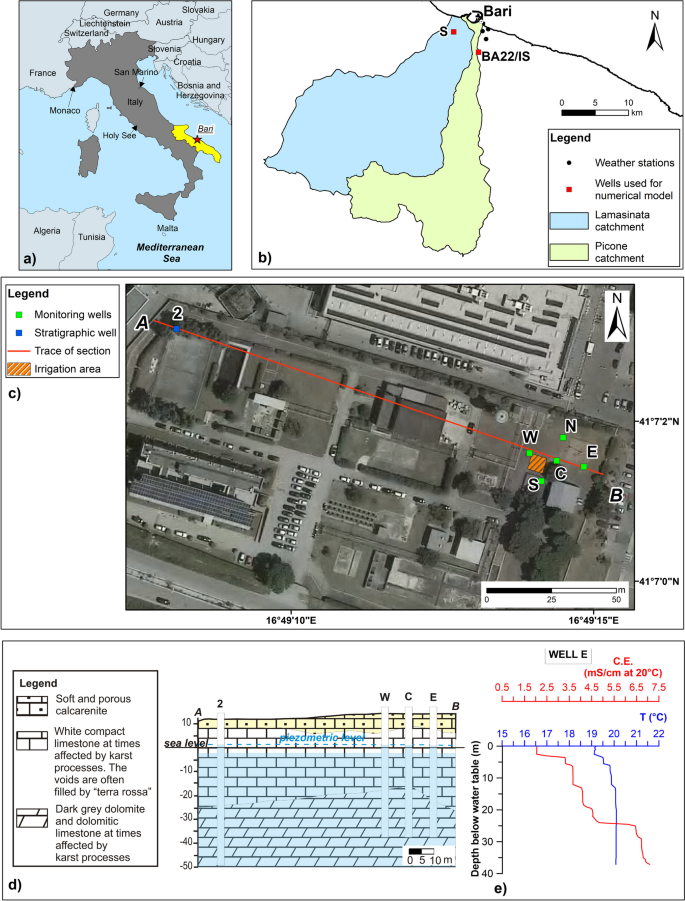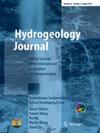通过多种实验方法利用人工降雨进行优先流的探测与定量化
IF 2.3
3区 地球科学
Q2 GEOSCIENCES, MULTIDISCIPLINARY
引用次数: 0
摘要
非饱和带的优先流强烈影响着重要的水文过程,如入渗、污染物运移和含水层补给。由于在多孔介质中,水、空气和固体颗粒的相互作用引起了各种物理过程的组合,因此优先流是高度复杂的。需要进行大量的研究来提高理解、量化、建模和预测优先流的能力。为了解决这个问题,从实验室尺度到中尺度,多种实验测量的组合已经实施,以检测和量化碳酸盐和岩溶不饱和带的优先路径。这涉及到以下信息的整合:(1)岩心样品,通过汞侵入孔隙度计、蒸发、准稳态离心机和露点电位器实验室方法,研究孔隙尺寸分布对水力特性和优先流的潜在激活的影响;(2)人工洒水的现场实验,通过使用地球物理测量来可视化与次生孔隙度相关的优先路径;(3)利用间歇补给的间歇主衰退模型对野外资料进行中尺度评价。该研究表明,优先流动过程从核心尺度到两个不同的野外尺度都在运行,并通过快速流动对补给率和污染物的迁移产生后续影响,从而影响地下水的定性和定量状态。本文提出的结果是通过减少对补给和污染风险的低估来进行优先流量检测和数值模拟的罕见例子。本文章由计算机程序翻译,如有差异,请以英文原文为准。

通过多种实验方法利用人工降雨进行优先流的探测与定量化
Abstract Preferential flow in the unsaturated zone strongly influences important hydrologic processes, such as infiltration, contaminant transport, and aquifer recharge. Because it entails various combinations of physical processes arising from the interactions of water, air, and solid particles in a porous medium, preferential flow is highly complex. Major research is needed to improve the ability to understand, quantify, model, and predict preferential flow. Toward a solution, a combination of diverse experimental measurements at multiple scales, from laboratory scale to mesoscale, has been implemented to detect and quantify preferential paths in carbonate and karstic unsaturated zones. This involves integration of information from (1) core samples, by means of mercury intrusion porosimeter, evaporation, quasi-steady centrifuge and dewpoint potentiometer laboratory methods, to investigate the effect of pore-size distribution on hydraulic characteristics and the potential activation of preferential flow, (2) field plot experiments with artificial sprinkling, to visualize preferential pathways related to secondary porosity, through use of geophysical measurements, and (3) mesoscale evaluation of field data through episodic master recession modeling of episodic recharge. This study demonstrates that preferential flow processes operate from core scale to two different field scales and impact on the qualitative and quantitative groundwater status, by entailing fast flow with subsequent effects on recharge rate and contaminant mobilizing. The presented results represent a rare example of preferential flow detection and numerical modeling by reducing underestimation of the recharge and contamination risks.
求助全文
通过发布文献求助,成功后即可免费获取论文全文。
去求助
来源期刊

Hydrogeology Journal
地学-地球科学综合
CiteScore
5.40
自引率
7.10%
发文量
128
审稿时长
6 months
期刊介绍:
Hydrogeology Journal was founded in 1992 to foster understanding of hydrogeology; to describe worldwide progress in hydrogeology; and to provide an accessible forum for scientists, researchers, engineers, and practitioners in developing and industrialized countries.
Since then, the journal has earned a large worldwide readership. Its peer-reviewed research articles integrate subsurface hydrology and geology with supporting disciplines: geochemistry, geophysics, geomorphology, geobiology, surface-water hydrology, tectonics, numerical modeling, economics, and sociology.
 求助内容:
求助内容: 应助结果提醒方式:
应助结果提醒方式:


